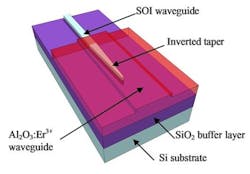Ultrafast optical amplifier: silicon and erbium function on one chip for the first time
| The chip includes a silicon on insulator (SOI) optical waveguide and erbium-doped aluminum oxide. (Image: University of Twente) |
Enschede, The Netherlands--Until now, no optical microchips existed on which both erbium-doped and silicon materials were integrated. In her thesis, University of Twente PhD candidate Laura Agazzi demonstrates a working chip of this sort for the first time, enabling light amplification via an erbium dopant. The will be able to amplify light at speeds up to 170 Gbit/s. The prototype chip has a signal gain of 7.2 dB at a wavelength of 1533 nm.
One of the possible results could be a laser with an extremely narrow linewidth of 1.7 kHz. “In any application that needs emission or amplification of light, this integration of both materials is useful," says Agazzi. "It is not limited to telecom. You could use these chips for sensor purposes, for tracing extremely small particles, for example."
Trade-off
Agazzi investigated the optical properties of aluminum oxide doped with erbium to understand the mechanisms that influence the amplification properties in a negative way. One of these is called energy-transfer upconversion (ETU), which is detrimental to good functionality. “If you want a large amplification, you would like to put many erbium ions in the material, this in turn can cause a higher ETU," says Agazzi. "There are possibilities in adapting the host material, causing less interaction of the ions. With my models, I have gained better insight in these and other mechanisms that lower the amplification."
Agazzi conducted her research within the Integrated Optical Microsystems (IOMS) of Markus Pollnau, which is part of the MESA+ Institute for Nanotechnology of the University of Twente. On Sep 20 she successfully defended her thesis, "Spectroscopic Excitation and Quenching Processes in Rare-Earth-Ion-Doped Al2O3 and their Impact on Amplifier and Laser Performance." Her thesis, or a summary, is available digitally.
